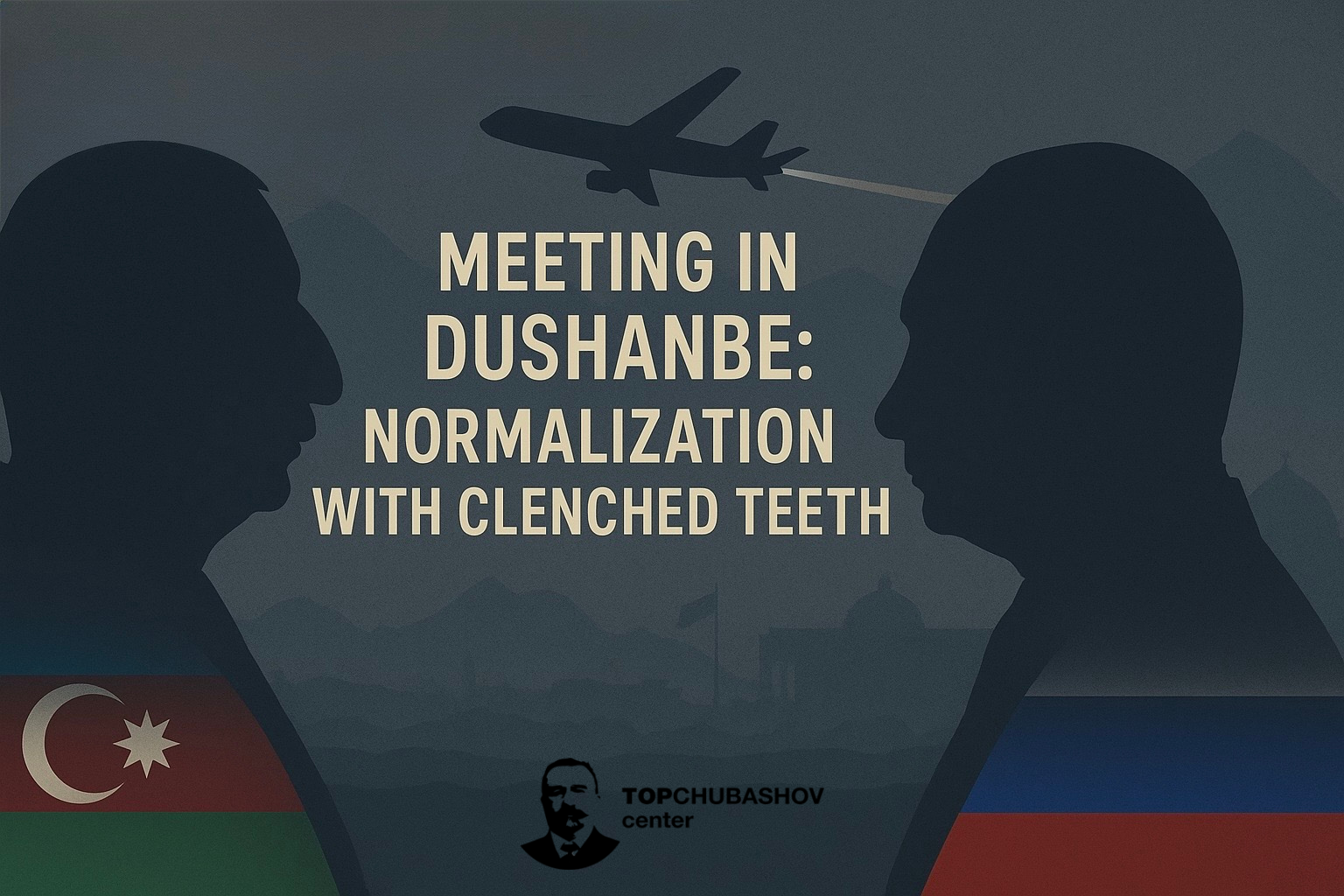Meeting in Dushanbe: normalization with clenched teeth

On 9 October Presidents Aliyev and Putin met at the CIS Summit in Tajikistan’s capital Dushanbe - for the first time since the tragedy of the Azerbaijani airplane last December that launched an unprecedented crisis in the relations between Baku and Moscow.
At the meeting, President Putin apologised (although again, not without some ambiguity) for the incident, acknowledging the fact that it had been caused by a Russian air defence system missile, which the Kremlin had been consistently denying for many months.
He also promised to take all the necessary measures, including the investigation and prosecution of culprits and paying compensation to Azerbaijan. The leaders seemed to be in a positive mood, thus sending a signal about a broad deescalation of tensions. These signals started to materialise after the meeting, when Baku and Moscow announced the release of two prisoners- the director of Sputnik’s office in Azerbaijan Igor Kartavykh and the former director of a notable Moscow theatre, ethnic Azerbaijani Mammadali Aghayev. Their arrests this summer had been interpreted as the direct outcome of the bilateral confrontation.
First of all, this step, taken by the Russian president, is in itself quite unusual and unexpected.
The ethos of the Russian elite has traditionally viewed public apologies to foreign states, let alone post-Soviet countries like Azerbaijan still viewed by many as Russia’s “soft underbelly” and zone of influence, as a sign of weakness.
Moreover, this apology represented a clear U-turn after Kremlin’s prolonged attempts to deny its own guilt, discredit facts announced by the Azerbaijani side, instead moving the conversation into the “Russophobia” paradigm and launching a full-fledged anti-Azerbaijani campaign in June 2025, whereby many prominent Azerbaijani businessmen in diaspora were arrested or stripped of their Russian citizenship, while the so-called “patriotic” TV programmes and online media threatened Baku with a full-blown expropriation of Azerbaijani-owned businesses, a trade war and even a new “special military operation”. Moreover, Russia hit several pieces of SOCAR’s infrastructure in Ukraine. In response, Baku minimised the intensity of contacts with Moscow on all levels, and President Aliyev’s statements regarding Moscow’s role in the airplane accident and repressions against Azerbaijanis, as well as the old issues such as the Armenian-Azerbaijani conflict, grew more and more critical. But most importantly, almost 5 years after the 44-day war, Baku initialed the text of a peace agreement with Yerevan- and this happened under the aegis of US President Trump in the White House.
As both leaders smiled and threw eulogies for Trump’s peacemaking efforts, the scale of Russia’s geopolitical backsliding became very obvious.
Hence, the meeting in Dushanbe can be interpreted as a very significant political victory for President Aliyev, who demonstrated patience in the face of severe pressure from Russia and related uncertainties.
Putin’s U-turn will be a vivid reminder for regional elites about Moscow’s growing vulnerabilities, particularly as the cumulative effect of sanctions and Ukraine’s systematic strikes on the Russian oil bases and refineries for the first time create a real threat of fuel shortage and industry closures. Despite the talk of Russia’s growing assertiveness vis-a-vis geopolitical rivals exploited by the state propagandists to boost the frail popularity of the Ukrainian war and dispel pessimistic moods, in fact Moscow started to depend much more on those countries it has never regarded as equal partners. This is why those media who would rarely miss a day to demonise and threaten Azerbaijan during the heyday of the confrontation, are not very outspoken about the latest presidential meeting- and some of them, such as the much-followed Telegram channel “Rybar”, tried to downright distort the gist of Putin’s message, falsely claiming that Russian position hasn’t changed since December 2024, while also inventing Aliyev’s claims that Moscow had struck the plane on purpose (he never made such a statement).
To sum up, we are witnessing a new geopolitical reality where the balance of power between Russia and Azerbaijan (and in fact, many other post-Soviet republics) has shifted so much that Moscow can no longer behave as an uncontested hegemon in the South Caucasus and has to accept Baku as an equal partner.
While Putin’s step will pave the way for deescalation which will likely continue with the further release of detainees, certain restoration of cultural and educational contacts and mutual toning down in the media, the relations will not go back to normal; rather, a new normal is about to form where Moscow won’t aspire for an exclusive status in the region and will have to take into account the growing role of Türkiye, US and potentially actors, and finally leave the aspirations of controlling South Caucasus through conflicts, in the past.
We can expect further steps from Baku towards boosting its strategic sovereignty, most notably through the integration efforts within the OTS which at the summit in Gabala had announced, a day before the meeting in Dushanbe, the birth of the new format- OTS+, which will allow for a stronger global outreach of the nascent alliance.







